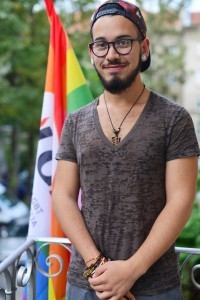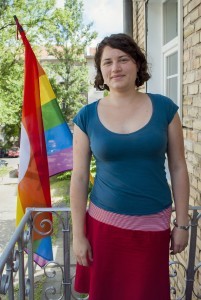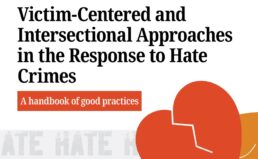Since a few years ago, our organization has been having the pleasure of welcoming young people from different European countries. This is due to our collaboration in EVS projects with the European Commission. We believe that this kind of experience can be of added value not only to young volunteers, who obtain a practical experience within a human rights organization and have the possibility, during 10 months, to develop their own skills and knowledge but also to us, for the wisdom and novelty that they bring. One of the aspects that we consider always important to take into account is to know our volunteers evaluation after their experience in our organization. Today we would like to share with all these interviews made to two former volunteers of LGL: Annemarie and Yuri. We tried to get a general view of before, during, and after their experience; going through, among others, their expectations, challenges and learning.
What expectations did you have prior to coming to Lithuania as EVS volunteer?
Annemarie: Well, when I started my EVS I had already been living in Lithuania for more than a year so I did not have any specific expectations towards the country. I did have expectations towards the volunteering service though. I had been active in journalism already several years when I realized that it is not my dream job anymore and that I would rather like to work in some kind of project management connected to human rights. And when I had to witness a very awful “Day of the Family” in the parliament I knew that I wanted to “test” that kind of job in a queer organization.
Yuri: Even though the excitement being involved in an international volunteering project could give me, I did not have any expectations towards Lithuania – any at all. I was ready for the worst. Reality turn out yet surprisingly positive.
What was it like to volunteer in LGL? Was it different from what you expected?
Annemarie: It certainly was challenging. There is a lot of work and I was learning so many things at the same time, contentual and processual. Sometimes I was frustrated because there were things which I could not implement – because of certain laws, because society was not ready for them, because the everyday work did not allow it; barries showed up in places where I had not been expecting them – and they did not show up in places where I had been expecting them.
Yuri: Working as a volunteer in LGL was tough, busy, heavy, and stressing, but extremely fulfilling. Schedules and deadlines were always in front of me and every day had a deep true meaning. As I did not rely any expectations on Vilnius, I neither did on the Lithuanian Gay League. My only real expectation – “hope”, I would rather say – was to develop my knowledge on LGBTQIA topics further and to get to know how to help the community to overcome their problems better, to be able to give my contribution to social development.
What did you learn as an EVS volunteer in LGL, both as a person and professionally?
Annemarie: I simply grew – through things I learned, experiences I made, people I met. And, apart from the general knowledge, growth and gaining one year of working experience, I learned how to create safe spaces. That helps me a lot in my work as a volunteer coordinator and trainer.
Yuri: The teachings I have received in LGL are many, but order, organization and time-management were the first and main ones. The European Voluntary Service, and so partly LGL, gave me also the possibility to enhance my English skills, to develop my intercultural mediation, to improve my communication, pedagogical and social skills, and to grow as a person, finding a path to follow and strengthening the core values that are still part of my identity today.
Is the situation of LGBT* human rights in your country and Lithuania different? Did your involvement in LGL’s activities change your approach to these issues?
Annemarie: The situation of queer people in Germany certainly is better than in Lithuania, for example, finally!, everyone is allowed to marry. However, it is far from being as good as most people think/ expect. At the same time the situation in Lithuania is not as bad as you might expect. The community is brave and strong and has achieved so much during the past years. From my point of view they could sometimes be even more proud and daring. A big difference: In Germany there is many places you can reach out to (not in villages though) – in Lithuania it is very centralized. This makes it hard for many people to reach out for support and help. My involvement with LGL did not change my approach because I was always interested in and supportive of queer rights. But my knowledge grew a lot, I am faster aware of things.
Yuri: LGBT+ community is really different, in Italy. Much more open and public, but controversially also much more normative and binary, in comparison to the open and younger part of the Lithuanian LGBT+ community. The differences are many: sexuality is a topic that Italian folks seem to approach more easily, Lithuanian activism seems to head higher and to be more decise and radical, Italians yet face and challenge heteronormativity with more visibility and impact. Being in LGL taught me the importance that Coming Out has on the entire society and its importance and role in the common social evolution. LGL’s community also led me to understand my gender and to free my expression over and to be part of the movement also through my body and my expression.
Were there any cultural differences that you have noticed in Lithuania?
Annemarie: In general Germany and Lithuania are not that different from each other. I was born after the fall of the wall and the USSR – but my parents grew up in the GDR, so there’s also a lot of things in the recent past I can easily connect to (the architecture, for example).
Yuri: Lithuanian expressivity and meteoropathy have always been the main cultural challenges that I have faced, but also roots of some of the greater learning outcomes.
What is your opinion about EVS programme? What advice would you give to young people interested in EVS?
Annemarie: The EVS is one of the best things that was ever established to let people experience peace and intercultural friendship. And I am very disappointed that it shall be turned into the European Solidarity Corps which will, at least at the given point, lead to major cuts in opportunities, support, and partner countries. Yes, there must be an opportunity for more young people to participate in this program. But the quality must be kept. This is what connects people all over Europe and I really hope the EU will understand this and invest more money. An advice: I know it is hard to get an EVS and you need to write countless applications. If you don’t have very specific reasons I would absolutely recommend you to not look for an EVS in a certain country. Look for programs that interest you, that will challenge you, working fields you always wanted to learn more about. You will mainly have international contacts because one does not easily grow into a new culture and country and it is easier to connect with people who are new as well. Looking at the experience of many other people who did an EVS: You will connect to the country you are volunteering in. And you will find friends. No matter which country it is.
Yuri: The European Voluntary Service is an incredible possibility, part of the wide range of amazing Erasmus+ opportunities which aim at growth on a social and communitarian, and European level, and that offer innumerable educational, professional, (multi)cultural, and human challenges and teachings. The EVS is specially remarkable because of its deep social meaning, as it spreads active participation and social inclusion, values that are too often undervalued by National programmes.






